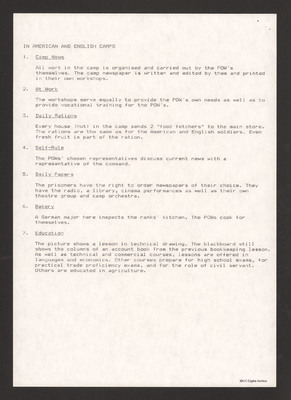In American and English camps
Title
In American and English camps
Description
Notes on camp news, at work, daily rations, daily papers, bakery and education.
Language
Type
Format
One page typewritten document
Publisher
Rights
This content is available under a CC BY-NC 4.0 International license (Creative Commons Attribution-NonCommercial 4.0). It has been published ‘as is’ and may contain inaccuracies or culturally inappropriate references that do not necessarily reflect the official policy or position of the University of Lincoln or the International Bomber Command Centre. For more information, visit https://creativecommons.org/licenses/by-nc/4.0/ and https://ibccdigitalarchive.lincoln.ac.uk/omeka/legal.
Contributor
Identifier
BCleggPVGibsonAv10031
Transcription
IN AMERICAN AND ENGLISH CAMPS
1. [underlined]Camp News[/underlined]
All work in the camp is organised and carried out by the POW's
themselves. The camp newspaper is written and edited by them and printed
in their own workshops.
2. [underlined]At Work[/underlined]
The workshops serve equally to provide the POW's own needs as well as to
provide vocational training for the POW·s.
3. [underlined]Daily Rations[/underlined]
Evet-y house (hut) in the camp sends 2 "-food ,'etchers" to the main store.
The rations are the same as for the American and English soldiers. Even
fresh fruit is part of the ration.
4. [underlined]Self-Rule[/underlined]
The POWs' chosen representatives discuss current news with a
representative of the command.
5. [underlined]Daily Papers[/underlined]
The prisoners have the right to order newspapers of their choice. They
have the radio, a library, cinema performances as well as their own
theatre group and camp orchestra.
6. [underlined]Bakery[/underlined]
A German major here inspects the ranks' kitchen. The paws cook for
themselves.
7. [underlined]Education[/underlined]
The picture shows a lesson in technical drawing. The blackboard still
shows the columns of an account book from the previous bookkeeping lesson.
As well as technical and commercial courses, lessons are offered in
languages and economics. Other courses prepare for high school exams, for
practical trade proficiency exams, and for the role of civil servant.
Others are educated in agriculture.
1. [underlined]Camp News[/underlined]
All work in the camp is organised and carried out by the POW's
themselves. The camp newspaper is written and edited by them and printed
in their own workshops.
2. [underlined]At Work[/underlined]
The workshops serve equally to provide the POW's own needs as well as to
provide vocational training for the POW·s.
3. [underlined]Daily Rations[/underlined]
Evet-y house (hut) in the camp sends 2 "-food ,'etchers" to the main store.
The rations are the same as for the American and English soldiers. Even
fresh fruit is part of the ration.
4. [underlined]Self-Rule[/underlined]
The POWs' chosen representatives discuss current news with a
representative of the command.
5. [underlined]Daily Papers[/underlined]
The prisoners have the right to order newspapers of their choice. They
have the radio, a library, cinema performances as well as their own
theatre group and camp orchestra.
6. [underlined]Bakery[/underlined]
A German major here inspects the ranks' kitchen. The paws cook for
themselves.
7. [underlined]Education[/underlined]
The picture shows a lesson in technical drawing. The blackboard still
shows the columns of an account book from the previous bookkeeping lesson.
As well as technical and commercial courses, lessons are offered in
languages and economics. Other courses prepare for high school exams, for
practical trade proficiency exams, and for the role of civil servant.
Others are educated in agriculture.
Collection
Citation
“In American and English camps,” IBCC Digital Archive, accessed July 7, 2024, https://ibccdigitalarchive.lincoln.ac.uk/omeka/collections/document/31037.
Item Relations
This item has no relations.

